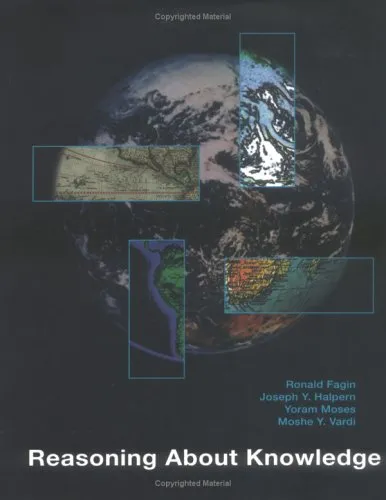Reasoning About Knowledge
4.5
Reviews from our users

You Can Ask your questions from this book's AI after Login
Each download or ask from book AI costs 2 points. To earn more free points, please visit the Points Guide Page and complete some valuable actions.Welcome to the realm of "Reasoning About Knowledge," an enlightening exploration that delves deep into the intricacies of knowledge representation, its dynamics, and its implications in the field of computer science and beyond. Written by Ronald Fagin, Joseph Y. Halpern, Yoram Moses, and Moshe Y. Vardi, this book is a landmark work in the arena of epistemic logic and distributed systems. It offers a profound understanding of how knowledge can be formalized, reasoned about, and utilized in computational settings.
Detailed Summary of the Book
"Reasoning About Knowledge" fundamentally addresses the questions: What does it mean to say that an agent knows something? How can we model the state of knowledge in a logical system? The book systematically unfolds various concepts related to the epistemic states of agents, offering a structured framework to analyze how knowledge evolves and is shared among them.
The authors adeptly combine theoretical foundations with practical insights. The book begins with a historical context of knowledge representation, setting the stage for a comprehensive discourse on modal logic as applied to knowledge states. The topics covered include the logic of knowledge, common knowledge, distributed knowledge, and the interplay between knowledge and action, among others. Throughout, the book emphasizes how these concepts are crucial in the design and analysis of distributed systems, artificial intelligence, and game theory.
Key Takeaways
- The formalization of knowledge is essential in understanding and designing complex systems.
- Epistemic logic is not just a philosophical concern but a practical tool in computer science.
- The dynamics of knowledge—how it changes and how it is transferred between agents—are crucial in distributed environments.
- Common knowledge plays a pivotal role in coordination and agreement in distributed systems.
- The book bridges the gap between theoretical concepts and their applications in real-world systems.
Famous Quotes from the Book
"Understanding knowledge and its distribution is fundamental to all aspects of science, from communication to computation."
"In the realm of distributed systems, what is known can dictate what can be done."
Why This Book Matters
"Reasoning About Knowledge" is not merely an academic treatise; it is a critical contribution that influences how professionals approach problems in distributed systems and related fields. The importance of this book lies in its dual strength— it provides a rigorous theoretical foundation while simultaneously addressing the tangible needs of practitioners in computer science.
By introducing and elaborating upon epistemic logic, the authors have equipped readers with the tools necessary to reason about, validate, and design systems where multi-agent coordination and decision-making are key. As such, students, researchers, and professionals grappling with intricate systems and protocols will find this book to be both a guide and a reference.
Ultimately, "Reasoning About Knowledge" aligns logical reasoning with practical needs, reconciling abstract theory with the realities of technological advancement. Its insights extend beyond academia, influencing industries where knowledge processing and multi-agent interaction are paramount.
Free Direct Download
Get Free Access to Download this and other Thousands of Books (Join Now)
For read this book you need PDF Reader Software like Foxit Reader


